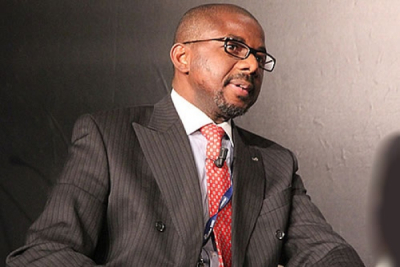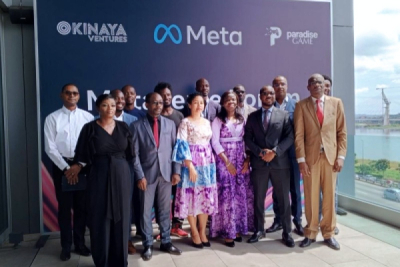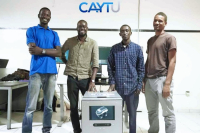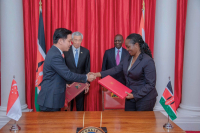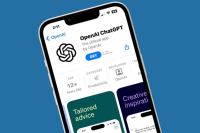With its coworking spaces, incubation and mentoring programs, as well as training and consulting services, DoniLab supports tech innovation and entrepreneurship in Mali.
DoniLab is a Mali-based business incubator founded in 2015. It is led by Tidiane Ball, a medical professional and entrepreneur. The incubator helps startups turn their ideas into minimum-viable products. It focuses on business sectors with high innovation potential such as information and communication technologies, health, and social innovation.
Through its coworking space equipped with state-of-the-art infrastructure, DoniLab offers entrepreneurs the opportunity to work in a comfortable space while benefiting from a range of services and high-speed Internet access. It also offers a digital fabrication lab -which serves as a learning space- and helps entrepreneurs, professionals, and established or yet-to-be-established companies get reliable information on their markets.
The incubator has initiated several programs, including Doni Green, an online climate change course for entrepreneurs, students, and professionals. The program aims to promote the development of the green economy through youth entrepreneurship in Mali.
DoniLab has supported other programs such as the Anwkathon Green Economy, a hackathon that aims to promote sustainable development by encouraging the youth to adopt green solutions. The incubator also supports Youth Connekt Mali, a program that aims to encourage youth entrepreneurship and involvement in development actions.
To reach entrepreneurs in rural areas, the incubator has created three additional hubs apart from its Bamako headquarter. On Saturday, May 20, at its Sikasso hub, it organized a training session on the production of hydroponic green fodder for entrepreneurs in the agriculture and livestock sector.
To date, DoniLab has incubated and accelerated 298 companies. It has also helped create 292 jobs -thanks to supported companies- and organized 35 events. The companies incubated by DoniLab have raised more than CFAF830 million ($1.3 million).
It is supported by several partners, including AfriLabs, the U.S. embassy in Mali, Afric'Innov, the World Bank, the International Organization of la Francophonie, and the French Development Agency (AFD).
Melchior Koba
Before launching MyFeda, the Beninese startup behind the solution had developed a popular payment aggregator. This new technology aims to facilitate online transactions.
MyFeda is a fintech solution developed by Beninese startup FedaPay SAS. It allows users to send and receive funds and make online payments anywhere in the world without a bank account.
"MyFeda is a mobile solution that allows you to manage your money daily. Whether your money is on your mobile money account or a card, MyFeda allows you to control all your expenses whatever their nature (online, or in a brick-and-mortar store),” the solution indicates on its web platform.
To access its services, users need to first download its mobile app (Android or iOS version) and create their MyFeda accounts. The process can be completed in just a few minutes.
With MyFeda, users can send and receive funds via mobile money in Benin, Togo, Côte d'Ivoire, Mali, Niger, Senegal, and Guinea. They can also send funds via Western Union and MoneyGram or make bank transfers using MasterCard and Visa cards. The solution also provides access to a virtual Visa card.
Each MyFeda account is managed by the Lagos-based pan-African bank, United Bank of Africa (UBA), and linked to a card from the same bank.
A monthly subscription fee is required to use the services offered by MyFeda. Since its launch, the Android version of the app has been downloaded more than 5,000 times, according to PlayStore data.
Adoni Conrad Quenum
Since 2020, Internet traffic and demand for broadband connectivity have been growing steadily in Africa. According to some institutions, IXPs could be a solution to localize traffic and improve connections.
The non-governmental organization "Internet for All" and the German company DE-CIX, in partnership with the Digital Development Agency (ADN), are set to launch Africa Congo Internet Exchange (ACIX), the largest Internet exchange in Central Africa, in Kinshasa today Monday.
“ACIX, Africa Congo Internet Exchange, provides an interconnection ecosystem for Central Africa to fulfill the growing interconnection needs of companies and end users – high-quality affordable connections for a better user experience, and for a more interconnected digital future,” ACIX explains in its “About” page.
The exchange is launched in the context of increasing Internet traffic across Africa, driven notably by digital transformation and new digital consumption patterns. According to the Internet Society (Isoc), Africa should invest more in Internet exchanges (IXPs) to improve connectivity on the continent and reduce access costs. To back its recommendation, in its report “Anchoring the African Internet Ecosystem: Lessons from Kenya and Nigeria’s Internet Exchange Points Growth,” the NGO indicates that Nigeria and Kenya boosted “the levels of Internet traffic that is locally exchanged from 30% to 70%” between 2012 and 2020 thanks to IXPs.
By enabling the local exchange of Internet traffic, IXPs save on large, recurring, and expensive international IP transit costs, reduce Internet costs, and significantly improve the quality and availability of connectivity, which in turn improves ISP revenues.
In that context, ACIX will be extremely useful. It is based in the DRC, the second largest country in Africa with nine border countries that have clearly stated ambitions for transnational and continental connectivity.
The exchange point is also part of the African expansion plan of the Deutscher Commercial Internet Exchange (DE-CIX), the world's largest Internet Exchange Point (IXP) in terms of traffic.
Samira Njoya
He has managed businesses in over 25 countries. With over 20 years of experience in retail financing, he develops solutions to facilitate access to credit for SMBs and underserved individuals.
In the recently booming fintech ecosystem in Africa, Chidi Okpala (photo) is undoubtedly one of the entrepreneurs marking the ecosystem. He is the founder and CEO of Asante Financial Services Group, a Kenya-based fintech startup founded in 2018.
His startup offers credit solutions with a focus on advancing the independence and financial well-being of underserved SMBs and individuals in Africa. The neo-bank provides funds to small businesses to help them manage their daily operations. It offers financing to licensed mobile money agents and provides loans to finance its customers' insurance premiums, ensuring maximum convenience and protection. To date, it has operations in Kenya, Uganda, Nigeria, and Rwanda and plans to expand to seven more countries by 2025.
Its founder, Chidi Okpala, studied finance at the Enugu State University of Science and Technology where he graduated with a B.sc. He also holds a Master of Business Administration from the University of Nigeria (UNN Nsuka) and a Sloan Master of Science in Management from the London Business School.
Since June 2022, he is a member of the international board of directors of Medair, an organization that helps vulnerable people in isolated and devastated communities survive crises and recover with dignity.
Before founding his company, the entrepreneur worked for major financial institutions. Among others, he was the managing director in charge of retail banking in 19 markets in Africa for the UBA Group between 2010 and 2012. Over the three following years, he was the president and CEO of Airtel Money, where he grew the mobile money business into one of the continent's largest retail financial service providers. From 2016 to 2018, he also worked for Atlas Mara Ltd as managing director of the fintech and digital segments.
In 2022, Asante Financial Services Group was awarded the Neobank Rising Star Award for East Africa at the 8th Africa Bank 4.0 Awards ceremony.
Melchior Koba
Last week, U.S. group META announced the upcoming deployment of the Metaverse in Côte d’Ivoire. At a forum in Abidjan, last Friday, Balkissa Ide Siddo, Meta Public Policy Director for Sub-Saharan Africa, said the metaverse could help medical students practice surgery. It could also make classes engaging and fun.
On Monday, May 15, 2023, Maurice Lévy, former head of French multinational communications company Publicis, inaugurated a new digital art platform called "YourArt" at the modern art museum Palais de Tokyo.
According to the former executive, YourArt wants to become the world's leading art and tech platform, allowing professional and amateur artists to showcase and sell their work.
Senegal held the first edition of “The Digital Week - Senegal Connect” last week, from May 16 to 20. The event, held in Dakar, gave startups the opportunity to showcase themselves before politicians, potential investors, and the general public as a whole. Some of the most promising were celebrated with awards.
Earlier last week, Caytu Robotics won the presidential award for digital innovation during the first edition of The Digital Week-Senegal Connect. The robotics startup, founded in 2020, is thus the second startup to ever receive that award. It seduced the jury with its technology that allows users to remotely control robots from anywhere in the world. With that award, Caytu Robotics went home with a CFAF30 million ($50,000) grant to support its growth.
“Today, remote outsourcing is primarily concerned with non-tangible digital skills such as software and digital content development. CAYTU closes the gap between remote digital outsourcing and onsite physical experience, enabling the distribution of skills and hands-on expertise to distant geographic locations where they are needed. [...] CAYTU’s Robotics Platform is the world’s first crowdsourced Robotics as a Service solution. Our software is robot-agnostic and therefore can integrate any robotics hardware/application through our API,” the awardee explains on its web platform.
Caytu has a mobile app from which users can issue commands. Currently, it is carrying out its pilot phase at Brigham Young University (BYU) in the United States. During that phase, previously selected students and staff can order food at the university restaurant. Once the order is received, in Dakar, the Caytu team remotely controls the robots to deliver the ordered food.
“We implement an AI-Human Collaborative Shared Control approach to put the human touch at the center of robotics and therefore unlock the full potential of robots and create new opportunities for individuals and businesses. We have made teleoperation as intuitive and easy as it can be; simply using our Android & iOS app, anyone with a mobile phone can become a CAYTU Pilot,” Caytu explains.
Brigham Young University (BYU), a private research institution, was chosen to host the pilot phase of Caytu because of robotics professor Benjamin Terry, a BYU professor involved in the project. He joined the project to collect data to better understand human-robot interactions. In the long run, Caytu wants to create a global network of autonomous delivery robots. Still, for now, after BYU, the Senegalese startup intends to expand to other universities around the world.
Adoni Conrad Quenum
He is shaping the global energy landscape by investing in sustainable solutions and creating strategic partnerships. His company actively promotes green energy in Africa.
Samuel Alemayehu (photo), an Ethiopian entrepreneur and investor, is at the forefront of the combat against climate change and the promotion of sustainable development in Africa. He leads a dedicated team that invests in innovative projects focused on renewable energy and energy efficiency.
Born in Ethiopia, he attended Stanford University where he earned a bachelor's in management science and engineering. In 2008, he co-founded and led -till 2013- 4Afri Technologies, a mobile service provider deployed in Ethiopia, Uganda, Tanzania, Rwanda, Zambia, Cameroon, DR Congo, Gabon, Senegal, Ghana, and Liberia. In 2005, he co-founded Corner Media Global LLC, a distributed social network focused on expatriate communities.
He is also the co-founder and chairman of Cambridge Industries, an engineering, design, procurement, and construction company focused on renewable energy projects throughout Africa. As a subsidiary of Cambridge Group of Companies, the company -founded in 2013- manages various renewable energy projects on the continent and has completed projects worth hundreds of millions of euros.
Cambridge Industries was for instance the first company to design, develop and build a large-scale waste-to-energy project in Africa. The project, called Reppie Waste-to-Energy, is based in Addis Ababa, Ethiopia. It currently processes more than 1,400 tons of waste daily.
As an investor, Samuel Alemayehu has backed several companies and sits on the board of several of them. These include East Africa Electric, the innovative communication and storytelling platform Pitch and Flow, VC Include, and NextBillion.ai, a company focused on artificial intelligence. His passion and actions have earned him recognition as one of the World Economic Forum's Young Leaders in 2018.
Melchior Koba
The partnership aims to reinforce cooperation between the two countries, which aim to leverage digital technologies to drive economic growth.
Singapore and Kenya signed, Thursday (May 18), three agreements including a memorandum of understanding covering the digital economy. The agreements were signed during an official visit of Singaporean Prime Minister Lee Hsien Loong to Kenya.
On Twitter, Kenyan President Williams Ruto said the MoU on the digital economy will "facilitate cooperation on cybersecurity, digitization of government services and ICT capacity building.”
In Singapore, the digital sector is a key component of economic plans, and the sector has grown significantly in recent years. The Singaporean IT market was valued at $41.76 billion in 2021. It is expected to grow at a compound annual growth rate (CAGR) of 7.9% to reach $61.06 billion by 2026, according to a recent report by Global Data.
Meanwhile, last year, Kenya launched a 10-year digital master plan -covering the 2022-2032 period- to align with global technological advances and strengthen its digital economy. The digital master plan identifies four key pillars: digital infrastructure, digital services, and data management as well as digital skills and stimulating digital innovation for entrepreneurship.
According to the Singaporean Prime Minister, the MoU will further the bilateral relationship between the two countries by targeting economic opportunities that will bolster shared prosperity.
Samira Njoya
In a statement released on Thursday, May 18, California-based OpenAI announced the launch of the iOS app of its artificial intelligence-based conversational agent, ChatGPT.
"The ChatGPT app is free to use and syncs your history across devices. It also integrates Whisper, our open-source speech-recognition system, enabling voice input. ChatGPT Plus subscribers get exclusive access to GPT-4’s capabilities, early access to features, and faster response times, all on iOS," the release reads.
Currently, the app is available for US users only but it will expand to additional countries “in the coming weeks.” The Android version is also coming "soon".
More...
The incubator encourages technological entrepreneurship and provides young talents with the resources they need to turn ideas into businesses. Its programs and events position it as a major player in the Mauritanian digital transformation ecosystem.
In Mauritania, Hadina RIMTIC is one of the key players that promote innovation and entrepreneurship in the tech ecosystem. The incubator, based in Nouakchott, was founded, in 2014, by IT engineer Mariem Kane, IT expert and entrepreneur Dahaba Diagana, and senior consultant Zeinebou Abdeldjelil, who is currently its president.
It aims to encourage innovation and entrepreneurship, boost digital adoption and improve the contribution of the digital economy to GDP. It also wants to facilitate the digital transformation of growth sectors and strengthen women’s entrepreneurship. It as well aims to contribute to the digitalization of growth sectors and to strengthen the participation of women in entrepreneurship.
To achieve its goals, Hadina RIMTIC offers coworking spaces to allow entrepreneurs to work in an environment that stimulates creativity and collaboration. It also offers mentoring and coaching programs, business development, and financing opportunities.
The incubator also develops innovative solutions for its partners, executes corporate social responsibility (CSR) programs and strategies, and offers smart sourcing services.
It regularly organizes events, workshops, and conferences to trigger interest in IT disciplines, share good practices, and create networking opportunities. In 2014, it launched the MauriAppChallenge, the first app development contest in Mauritania. In 2022, it also launched the Agri-entrepreneurship Program in partnership with the FAO to support businesses and start-ups operating in the agricultural sector.
Hadina RIMTIC also established an agricultural innovation center in Rosso and organized a STEM Summer Camp to train Mauritanians in robotics, electronics, and programming. The best students from this camp will represent Mauritania at the FIRST Global Robotics competition.
To date, it has incubated 5 start-ups, pre-incubated 26 start-ups, supported 40 projects, and organized 4 competitions as well as 35 conferences and training. Among the start-ups supported are DoctoRIM, Neotic, Habidem, and Taci Secure. It is supported by several partners including USAID, the World Bank, the French Embassy in Mauritania, Total Energies, and the Chamber of Commerce, Industry and Agriculture of Mauritania, among others.
Melchior Koba
The entrepreneurs behind the solution first developed a price comparison app before deciding to set up a solution to connect users to good deals and special offers.
Fomo is a digital solution developed by a South African startup, founded in 2020. It allows users access to special offers in restaurants and various leisure places. It uses geolocation features to determine the best deals, restaurants, and leisure spots closest to users.
Users can access its services via its Android and iOS apps. Once they register, they have to grant access to their geographical locations, which is needed to determine the nearest places. Some of the leisure places presented are museums, spas, paragliding, and horse riding destinations.
“We created this app because we were sick of laying in bed on a Saturday or having a lazy Wednesday where we don’t want to cook dinner, asking the age-old question… where should we go for dinner? What exciting activity can we do today?” the founders say.
Apart from allowing its users to find good deals and visit leisure places, it allows the owners of the listed spots to reach a broader audience. Fomo, therefore, advertises businesses that craft special offers, instead of spending on sponsored ads and similar marketing strategies.
The platform is seemingly a great success because, according to Playstore’s data, its Android app has been downloaded more than a hundred thousand times.
In September 2022, the startup signed a partnership with Google to allow users to book or make orders directly from Google Search, Map, or Assistant. "This is a big step for FOMO as we look to increase accessibility for South Africans to make and manage their reservations at their favorite restaurants both on the app, as well as through Google Search or Maps, quickly and efficiently, further stimulating an ailing industry affected by COVID-19," co-founder Jax Marx said when the partnership was signed with Google.
Adoni Conrad Quenum
Impact Lab plays a key role in promoting entrepreneurship and innovation in Africa. With a presence in 17 countries, it is among the largest technology hubs on the continent.
Founded in 2014 by Salma Kabbaj and Leyth Zniber, Impact Lab is a Morocco-based social innovation lab committed to accelerating the deployment of innovative solutions to address the continent's challenges.
It provides a dynamic platform for social entrepreneurs to develop innovative ideas and high-impact projects. It also assists in the operationalization of innovation governance and the framing of innovation strategy. The lab develops specific training programs adapted to the objectives of each company it supports and strengthens the digital skills of employees.
As an innovation hub, it also supports the framing and deployment of transformation projects following design thinking and lean principles. In addition, it connects companies, start-ups, and institutions to experiment collaborative approaches.
The lab has organized several acceleration programs including the Agritech Launchpad dedicated to Moroccan start-ups that have developed innovative solutions to address challenges in the agro-industrial value chain. It is also an implementing partner of the Investing in Innovation (I3) program in Francophone Africa.
From 2016 to date, Impact Lab has supported more than 250 startups, such as Kriterion, a company that uses artificial intelligence to provide actionable intelligence to digital companies in the heavy industry. It helped organize several events, such as the Fintech Challenge and the Mining Challenge. It has also deployed 25 innovation programs across the 17 countries it covers thanks to partners like Alvarium and Blackbelt in Morocco.
Melchior Koba
The solution is the result of a partnership between unicorn startup Fawry and Softec Technologies. It connects merchants with a network of self-employed delivery personnel.
Roaderz, an innovative digital solution created by the Egyptian unicorn Fawry, enables merchants to facilitate deliveries to their customers through a network of independent delivery drivers. The venture was established in 2022 as a collaborative effort between Fawry, Samer Gharaibeh (founder of the delivery startup Mylerz), Ammar Zawaideh (a corporate finance expert), and Softec Technologies.
“Our goal with Roaderz is to create a solution that can also have a broader social impact, by putting smaller businesses on a level playing field with larger competitors, providing couriers with flexible work and income opportunities, and reducing carbon emissions by decreasing the average kilometers traveled by a shipment before it reaches the end-user,” said Fawry’s CEO, Ashraf Sabry, in 2022.
The solution has a mobile app accessible on Android and iOS. Merchants can sign up to access the services offered after downloading the app. To order a delivery, they have to post a request and one of the available self-employed delivery agents will undertake the task.
When the package is picked up, the merchant can see from the application an estimate of the delivery time and follow the package in real time until it reaches its destination. Payments are handled by Fawry.
Since its launch, Roaderz’s Android app has been downloaded more than a thousand times. The solution intends to cover all of the governorates in Egypt but, there is no international expansion plan for the time being.
Adoni Conrad Quenum





